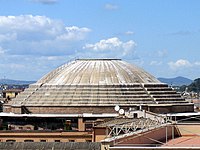
Photo from wikipedia
Abstract Pervious concrete can purify water, mitigate storm water runoff and reduce the urban heat island effect due to its larger porosity. However, its highly porous inner structure causes a… Click to show full abstract
Abstract Pervious concrete can purify water, mitigate storm water runoff and reduce the urban heat island effect due to its larger porosity. However, its highly porous inner structure causes a lower compressive strength in comparison with normal concrete. Therefore it is vital to accurately predict the two basic parameters: permeability coefficient (PC) and uniaxial compressive strength (UCS) before field application to reduce time and cost of a construction project. As traditional mathematical models cannot model the highly nonlinear relationships between PC (or UCS) and its constituents, this study addresses this problem by applying a hybrid artificial intelligence model: multi-output least squares support vector regression (MOLSSVR). This model can also improve the prediction accuracy by utilizing the relationship between the two outputs: PC and UCS. In addition, the hyperparameters of MOLSSVR are tuned by a beetle-antennae search (BAS) algorithm which is modified by incorporating self-adaptive inertia weight and Levy flight. To train the proposed model, a large number of pervious concrete samples with different mixture proportions were prepared in laboratory. The results show that the searching efficiency of the modified BAS is significantly higher than that of BAS. The proposed hybrid model achieves better prediction accuracy than other models in the literature. This method can be used to address other multi-output problems in civil engineering.
Journal Title: Construction and Building Materials
Year Published: 2020
Link to full text (if available)
Share on Social Media: Sign Up to like & get
recommendations!